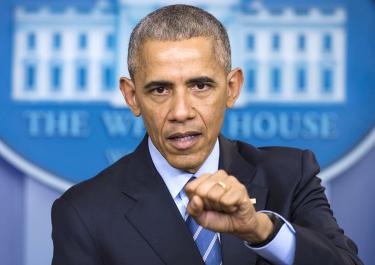Obama warns Trump over Taiwan ties
‘FULL CONFLICT MODE’The US president warned of a ‘very significant’ response if the US president-elect is not cautious in challenging China’s core policy on Taiwan
The Guardian and Reuters, WASHINGTON
US President Barack Obama has cautioned US president-elect Donald Trump against allowing relations with China to slip into “full conflict mode” after Trump put Beijing’s nose out of joint with a succession of controversial pre-inauguration foreign policy interventions.
Speaking on Friday at what is likely to be his last White House news conference, Obama urged his successor to beware of provoking a “very significant” response from Beijing over Taiwan.
The past two weeks have seen Trump take a series of public swipes at China, accusing Beijing of manipulating the yuan, building “a massive fortress” in the South China Sea and not doing enough to pressure North Korean leader Kim Jong-un.
Most controversially of all, the billionaire has also hinted he might upend nearly four decades of US-China ties by offering greater recognition to the government of Taiwan.
Trump’s questioning of the so-called “one China” principle drew protests from Beijing and led one state-run newspaper to call for swift preparations for a military invasion of Taiwan.
Obama said that, under a decades-old policy, China “views Taiwan as part of China, but recognizes that it has to approach Taiwan as an entity that has its own ways of doing things,” while Taiwan had agreed that, with some autonomy, it would not declare independence.
“That status quo, although not completely satisfactory to any of the parties involved, has kept the peace and allowed the Taiwanese to be a pretty successful ... economy and a people who have a high degree of self-determination,” Obama said.
Obama said he had advised Trump that foreign policy had to be conducted in a systematic, deliberate, intentional way.
Obama said Trump needed to grasp “that for China the issue of Taiwan is as important as anything on their docket.”
“The idea of ‘one China’ is at the heart of their conception as a nation and so if you are going to upend this understanding, you have to have thought through what the consequences are,” Obama said. “Because the Chinese will not treat that the way they will treat some other issues. They won’t even treat it the way they treat issues around the South China Sea, where we have had a lot of tensions. This goes to the core of how they see themselves and their reaction on this issue could end up being very significant.”
In Taipei, the government reiterated that it was committed to maintaining the “status quo” in its relations with China and in promoting peace and stability, and thanked Washington for deepening Taiwan-US relations.
A statement from the Presidential Office said the government looked forward to strengthening that relationship during Trump’s administration.
Obama said the importance of US-China collaboration in areas such as the global economy, security and international affairs was now such that “there is probably no bilateral relationship that carries more significance.”
“And where there is also the potential — if that relationship breaks down or goes into a full conflict mode — that everybody is worse off,” Obama added.
Foreign policy specialists on both sides of the Pacific have expressed concern at the potential for upheaval if Trump’s early forays into China policy continue after he takes office on Jan. 20.
Orville Schell, the head of the Center on US-China Relations at New York’s Asia Society, said that by threatening to defy Beijing over Taiwan Trump had “bearded the dragon.”
“He has probed the most sensitive nerve in US-China relations — the territorial integrity of the motherland and the idea of the inevitable return of Taiwan to the motherland’s embrace,” Schell said. “I am intrigued with Trump’s ability to disequilibrate what was something of a standoff” between the US and China.
Obama’s “virtue was to try to be consistent, steadfast and not to react too much from the gut and too emotionally. And here you have an incoming president who is exactly the opposite in each of those categories,” Schell added.
Then-US president Jimmy Carter switched diplomatic recognition from Taiwan to China in 1979, relegating Taiwan to part of “one China.”

No comments:
Post a Comment